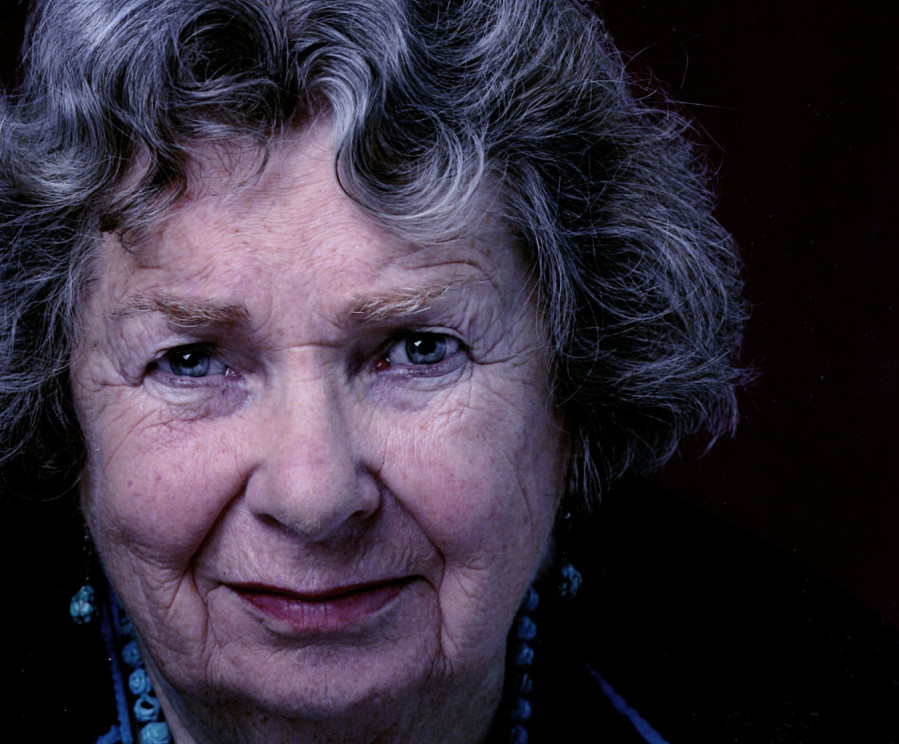“As an actress, I’m very good at doing what I’m told,” Angela Paton told me in the hushed tones of a confession. “I bring my own things to the character, in a very secret kind of personal way. I could never write out my method, because I’m so secret about it, and I’m a terrible teacher because, I think, I don’t want anyone to know my secret.”
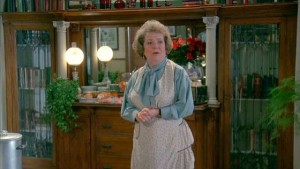
For the fledgling theatre critic I was at the time, her self-effacing demeanor was a big surprise. Offstage, the cofounder and artistic director of the adventurous little Berkeley Stage Company was a shy, quiet, small woman speaking so softly as to be almost inaudible. Onstage, Angela Paton—who died in May at the age of 86 in Oakland, Calif.—was unforgettable, projecting each character so powerfully it seemed permanently etched in your consciousness. And, though it may surprise those who know her from her most widely seen film role—as the sweetly clueless innkeeper opposite Bill Murray in Groundhog Day—many of these women were remarkably strong, even monstrous figures in plays by Albert Innaurato, Beckett, Genet, O’Neill, and others.
At the time of the aforementioned interview, at the end of 1981, Angie—as she was generally called—was preparing to take on no less monumental a figure than Brecht’s Mother Courage, having just finished a grueling run as a dying Elizabeth I in George W.S. Trow’s extended, intermissionless monologue, Elizabeth Dead. Trow’s tone poem wasn’t a great play, but Paton’s bravura performance and the production—directed by her husband and Berkeley Stage cofounder Robert W. Goldsby—were electrifying.
“The work bursts forth with sudden vehemence,” I wrote at the time. Paton’s shriveled, dying monarch, made up in a “sickly green shade like moldy parchment,” was an exercise in extraordinary vocal dexterity and psychological depth, with very little physical action, giving us a haunted, “sad, vindictive, delighted, shrewd, pitifully vain, self-deceptive and frightened” Elizabeth. It was, I wrote, a performance that “transcends the weaknesses of the script and lends it the catharsis one would expect of a more fully fledged drama.”
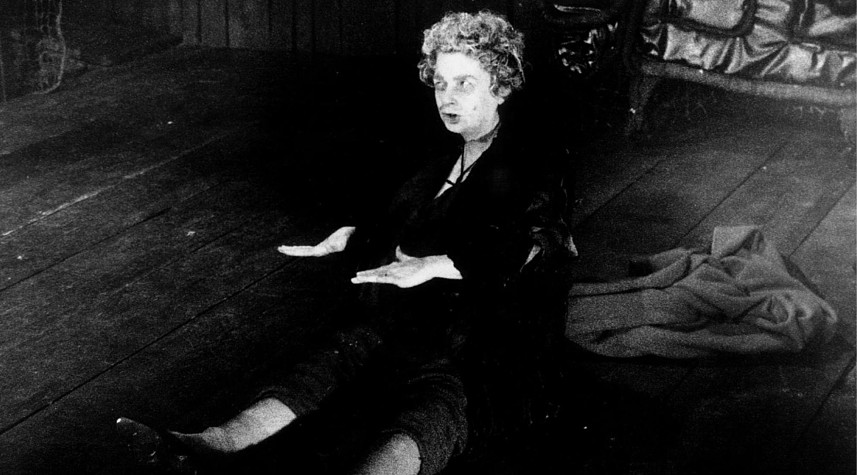
This was not the kind of review Ms. Paton liked to receive. “It always confuses me when critics say, ‘The play was terribIe but you were just wonderful,'” she told me. “I can’t do anything without something being there already. I cant just get up there and be Elizabeth. I’m combining with something in the script. It’s like telling a cook, ‘Y’know, you make wonderful cake but I hate the flour you’re using.'”
Born Jan. 11, 1930 in Brooklyn, Angie Paton often said her acting career began when she played a Rose in her second year at elementary school in Tucson, Ariz., at a boarding school to which she’d been sent as “a sickly child.” More seriously, she’d cite two shows she saw while attending the Philadelphia School for Girls (where she later rejoined her family) in the 1940s as having motivated her to devote herself to a life in the theater: Paul Robeson’s Othello, with Uta Hagen and Jose Ferrer; and “this little traveling group with this strange, rinky-dink version of A Winter’s Tale with its crepe-paper flowers that was just gloriously exciting to me.”
Paton made her professional debut at 16 doing summer stock with the Chase Barn Playhouse in New Hampshire, and continued to work there while studying at Carnegie Tech (later, Carnegie Mellon University), from which she graduated in 1951, and then joined Arena Stage as its first female company member. The following summer she was back at Chase Barn, where she met Goldsby, rushing onstage to bail him out when he went up on his lines. They were married eight weeks later, and remained together until her death.
After a stint at Columbia, where Goldsby was working with Eric Bentley, he was appointed a tenured professor at UC Berkeley in ’57. While Goldsby helped build Berkeley’s theatre arts program and directed shows at the Actors Workshop, Paton took time off from acting for most of the next decade—with occasional exceptions, such as the female lead in Antony and Cleopatra, directed by Margaret Webster—to raise their three children, Gwendolyn, Matthew, and Robert E. Goldsby. Then the American Conservatory Theater arrived in San Francisco, and William Ball, who knew Paton’s work from their time together at Carnegie, joined Goldsby in cajoling and enticing her to join the acting company.
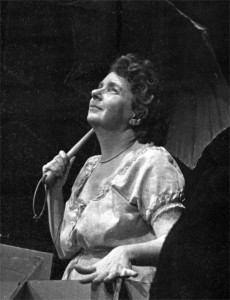
Over the next four years, Paton played 11 leading roles with ACT, ranging from Olga in Three Sisters to Mary Tyrone in Long Day’s Journey Into Night, Gertrude in Hamlet and Lady Bracknell in The Importance of Being Earnest. By 1970, though, she and Goldsby began to feel the company was taking less exciting artistic risks than it had before. Seeking to do more work with new plays, they did a few shows with the young Magic Theatre, then founded Berkeley Stage in a former motorcycle garage in ’74, opening with Paton in Beckett’s Happy Days.
For the next 10 years, until the always cash-strapped theatre closed in ’84, the Stage featured mostly new plays—more local or West Coast premieres than world premieres—by the likes of Innaurato, Michael McClure, John Guare, David Rabe, Heiner Muller, Michel Tremblay, and Sam Shepard, with the occasional adventurous classic (O’Neill’s expressionist The Great God Brown, Genet’s The Maids). It also staged experimental music-theatre festivals and provided an early home for many young actors and designers, as well as such now noted directors as Tony Taccone and Oskar Eustis, long before they joined up to commission Tony Kushner’s Angels in America and went on, respectively, to Berkeley Rep and the Public Theater, respectively. And it provided Paton with what she termed her long overdue “rite of puberty,” when she made her Broadway debut with Innaurato’s Passione, which he had written for her.
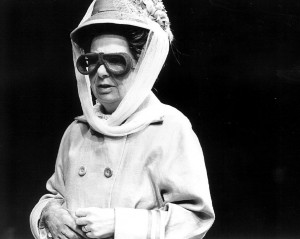
After the Stage folded, Paton and Goldsby moved to Los Angeles and she did much more acting in film and on TV until she suffered a stroke in 2015. She also appeared at the Mark Taper Forum, Los Angeles Theatre Center, South Coast Rep, Geffen Playhouse, and San Diego Rep. In ’87, she helped Berkeley Rep celebrate the O’Neill centenary with memorably differentiated portraits of the mothers in Ah, Wilderness! and Long Day’s Journey, and she returned for a delectably repugnant outing as the querulous mother in Martin McDonagh’s The Beauty Queen of Leenane.
Oh, and her Mother Courage? “Lovingly crafted,” I wrote at the time, “from the cock of her head to…the way her hands continue, almost absent-mindedly, to appraise each new object she acquires and express her tenacity of purpose.” I know I’ll miss her. And that I’m richer for having experienced her work.
Robert Hurwitt has covered San Francisco Bay Area theatre since 1978 and is a recipient of the George Jean Nathan Award for theatre criticism. He recently retired after serving as theatre critic for the San Francisco Chronicle since 2000.

